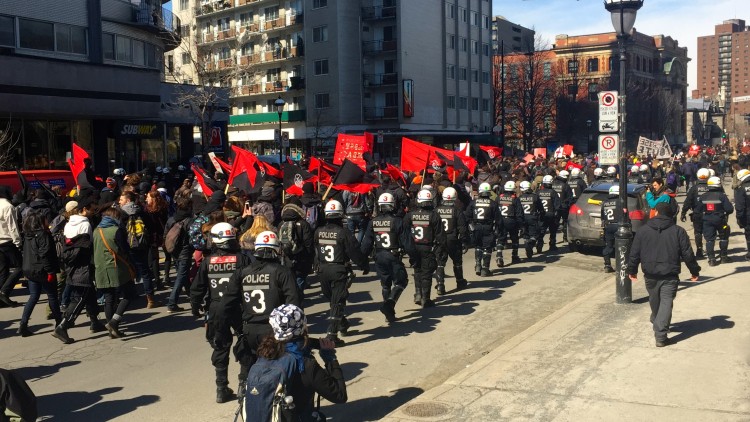Vicente Navarro is a leading analyst of the history and origins of the financial crisis in Spain (and Europe in general) and an economic adviser to Podemos. His book There Are Alternatives (Hay Alternativas: Propuestas para Crear Empleo y Bienestar Social en España), written with economists Juan Torres and Alberto Garzón, became an inspiration to the Indignados movement. Asked by Podemos, Navarro and Torres developed a new economic policy outlining the challenges of the current era and economic strategies that serve the people rather than the corporations. Podemos distributed this publication under the title An Economic Project for the People (Un Proyecto Económico para la Gente). Presented by Pablo Iglesias and the authors, the project became a major media event, denounced by banks and corporate representatives all over Europe and acclaimed by many throughout Spain.
Continue reading
Monthly Archives: July 2015
David Cooney: The Montréal student protests
Vers un Automne Érable?1
Whenever threatened, the first thing power restricts is the ability to linger or assemble in the street.
—Henri Lefebvre2
In September of 2014, I arrived in Montréal to study the students’ strike that had erupted throughout the province of Québec three years earlier. I was particularly interested in learning more about the evolution of the movement itself and the networks it had forged with related movements: the Chilean student protests, Occupy Wall Street, and 15M.
Continue reading
Theodoros Rakopoulos: Of direct and default democracy: The debt referendum in Greece
Thessaloniki, 4–5 July 2015
Default has a twofold meaning: it means both “taken for granted,” or the known path, and an economic halt on someone’s debts. Greece has recently oscillated between these two meanings. On the one hand, the Left government’s choice to go to the ballot for a referendum should have been a default choice of any democratic polity. It has faced fierce opposition, but eventually its advice to the electorate (“vote a decisive NO”) had huge influence among many—and triumphed, with an unprecedented landslide victory, at 61.5 percent. On the other, this choice has coincided with a default on the country’s debt to the IMF. There are threats it might lead, given Greece’s lenders’ pressure, to a generalized default situation and indeed an ousting out of the euro due to the lenders’ self-righteous policies. Prime Minister Alexis Tsipras announced the referendum on 26 June, at 1:50 a.m. EET, to be held nine days after, on 5 July. The question would be whether the Greek citizens would accept the conditions for a bailout proposed by the troika (the EU Commission, the European Central Bank, and the IMF). The negotiations between the Eurogroup and the Greek government had ended up in a cul-de-sac.
Continue reading
